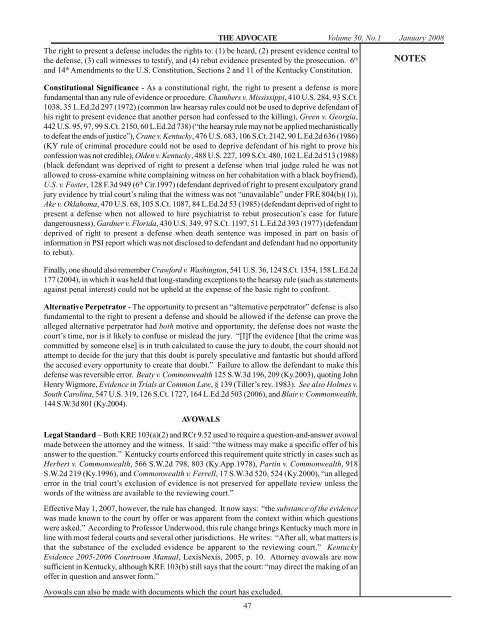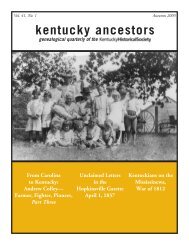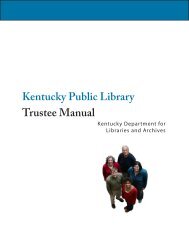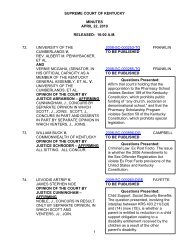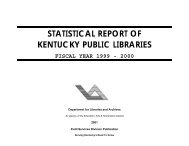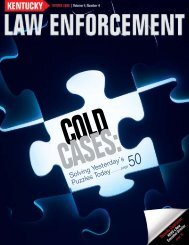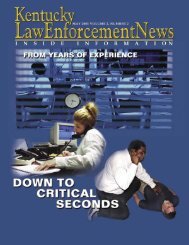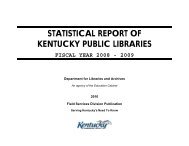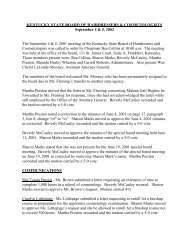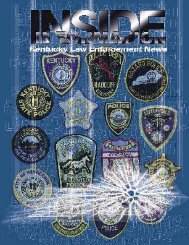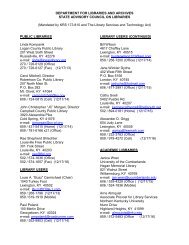Jan08 Advo.pmd - e-archives Home
Jan08 Advo.pmd - e-archives Home
Jan08 Advo.pmd - e-archives Home
You also want an ePaper? Increase the reach of your titles
YUMPU automatically turns print PDFs into web optimized ePapers that Google loves.
THE ADVOCATE Volume 30, No.1 January 2008<br />
The right to present a defense includes the rights to: (1) be heard, (2) present evidence central to<br />
the defense, (3) call witnesses to testify, and (4) rebut evidence presented by the prosecution. 6 th<br />
and 14 th Amendments to the U.S. Constitution, Sections 2 and 11 of the Kentucky Constitution.<br />
Constitutional Significance - As a constitutional right, the right to present a defense is more<br />
fundamental than any rule of evidence or procedure. Chambers v. Mississippi, 410 U.S. 284, 93 S.Ct.<br />
1038, 35 L.Ed.2d 297 (1972) (common law hearsay rules could not be used to deprive defendant of<br />
his right to present evidence that another person had confessed to the killing), Green v. Georgia,<br />
442 U.S. 95, 97, 99 S.Ct. 2150, 60 L.Ed.2d 738) (“the hearsay rule may not be applied mechanistically<br />
to defeat the ends of justice”), Crane v. Kentucky, 476 U.S. 683, 106 S.Ct. 2142, 90 L.Ed.2d 636 (1986)<br />
(KY rule of criminal procedure could not be used to deprive defendant of his right to prove his<br />
confession was not credible), Olden v. Kentucky, 488 U.S. 227, 109 S.Ct. 480, 102 L.Ed.2d 513 (1988)<br />
(black defendant was deprived of right to present a defense when trial judge ruled he was not<br />
allowed to cross-examine white complaining witness on her cohabitation with a black boyfriend),<br />
U.S. v. Foster, 128 F.3d 949 (6 th Cir.1997) (defendant deprived of right to present exculpatory grand<br />
jury evidence by trial court’s ruling that the witness was not “unavailable” under FRE 804(b)(1)),<br />
Ake v. Oklahoma, 470 U.S. 68, 105 S.Ct. 1087, 84 L.Ed.2d 53 (1985) (defendant deprived of right to<br />
present a defense when not allowed to hire psychiatrist to rebut prosecution’s case for future<br />
dangerousness), Gardner v. Florida, 430 U.S. 349, 97 S.Ct. 1197, 51 L.Ed.2d 393 (1977) (defendant<br />
deprived of right to present a defense when death sentence was imposed in part on basis of<br />
information in PSI report which was not disclosed to defendant and defendant had no opportunity<br />
to rebut).<br />
Finally, one should also remember Crawford v. Washington, 541 U.S. 36, 124 S.Ct. 1354, 158 L.Ed.2d<br />
177 (2004), in which it was held that long-standing exceptions to the hearsay rule (such as statements<br />
against penal interest) could not be upheld at the expense of the basic right to confront.<br />
Alternative Perpetrator - The opportunity to present an “alternative perpetrator” defense is also<br />
fundamental to the right to present a defense and should be allowed if the defense can prove the<br />
alleged alternative perpetrator had both motive and opportunity, the defense does not waste the<br />
court’s time, nor is it likely to confuse or mislead the jury. “[I]f the evidence [that the crime was<br />
committed by someone else] is in truth calculated to cause the jury to doubt, the court should not<br />
attempt to decide for the jury that this doubt is purely speculative and fantastic but should afford<br />
the accused every opportunity to create that doubt.” Failure to allow the defendant to make this<br />
defense was reversible error. Beaty v. Commonwealth 125 S.W.3d 196, 209 (Ky.2003), quoting John<br />
Henry Wigmore, Evidence in Trials at Common Law, § 139 (Tiller’s rev. 1983). See also Holmes v.<br />
South Carolina, 547 U.S. 319, 126 S.Ct. 1727, 164 L.Ed.2d 503 (2006), and Blair v. Commonwealth,<br />
144 S.W.3d 801 (Ky.2004).<br />
AVOWALS<br />
Legal Standard – Both KRE 103(a)(2) and RCr 9.52 used to require a question-and-answer avowal<br />
made between the attorney and the witness. It said: “the witness may make a specific offer of his<br />
answer to the question.” Kentucky courts enforced this requirement quite strictly in cases such as<br />
Herbert v. Commonwealth, 566 S.W.2d 798, 803 (Ky.App.1978), Partin v. Commonwealth, 918<br />
S.W.2d 219 (Ky.1996), and Commonwealth v. Ferrell, 17 S.W.3d 520, 524 (Ky.2000), “an alleged<br />
error in the trial court’s exclusion of evidence is not preserved for appellate review unless the<br />
words of the witness are available to the reviewing court.”<br />
Effective May 1, 2007, however, the rule has changed. It now says: “the substance of the evidence<br />
was made known to the court by offer or was apparent from the context within which questions<br />
were asked.” According to Professor Underwood, this rule change brings Kentucky much more in<br />
line with most federal courts and several other jurisdictions. He writes: “After all, what matters is<br />
that the substance of the excluded evidence be apparent to the reviewing court.” Kentucky<br />
Evidence 2005-2006 Courtroom Manual, LexisNexis, 2005, p. 10. Attorney avowals are now<br />
sufficient in Kentucky, although KRE 103(b) still says that the court: “may direct the making of an<br />
offer in question and answer form.”<br />
Avowals can also be made with documents which the court has excluded.<br />
47<br />
NOTES


